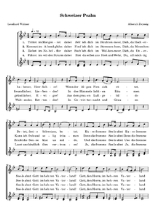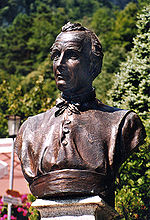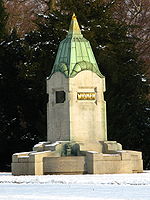
Swiss Psalm
Encyclopedia
The Swiss Psalm is the national anthem
of Switzerland
. It was composed in 1841, by Alberich Zwyssig
(1808–1854). Since then, it has been frequently sung at patriotic events. The Federal Council
declined however on numerous occasions to accept the psalm as the official anthem. This was because the council wanted the people to express their say on what they wanted as a national anthem. From 1961 to 1981 it provisionally replaced ("When You Call, My Country", French ; Italian , Romansh ) the anthem by Johann Rudolf Wyss
(1743–1818) which was set to the melody of God Save the Queen
. On April 1, 1981, the Swiss Psalm was declared the official Swiss national anthem.
(1743–1818), was the first national anthem, used until 1961. The Swiss Psalm was composed in 1841 by Alberich Zwyssig
(1808–1854), with lyrics by Leonhard Widmer (1809–1867). Since then it has been frequently suggested it be adopted as the official anthem, but the Swiss Federal Government has refused several times, wishing to let the people decide what they want to sing on political and military occasions. The setting of the hymn to the British tune of God Save the Queen
led to embarrassing situations when both countries' anthems were played. Therefore it was replaced with another tune in 1961. After a trial period of three years the Swiss tune was adopted indefinitely in 1965. The statute could not be challenged until ten years later but did not totally exclude the possibility of an ultimate change. A competition was set up in 1979 to search for a successor to the anthem. Despite many submissions, none of the others seemed to express the Swiss sentiment. The Swiss anthem finally got its definitive statutory status in April 1981, the Federal Council maintaining that it was purely a Swiss song suitably dignified and solemn. The popularity of the song has not been established. At least, it has been shown with several vox pop
s taken that many people do not know it at all, and only a small percentage can recite it all.
There are two tentative replacements for the psalm:


National anthem
A national anthem is a generally patriotic musical composition that evokes and eulogizes the history, traditions and struggles of its people, recognized either by a nation's government as the official national song, or by convention through use by the people.- History :Anthems rose to prominence...
of Switzerland
Switzerland
Switzerland name of one of the Swiss cantons. ; ; ; or ), in its full name the Swiss Confederation , is a federal republic consisting of 26 cantons, with Bern as the seat of the federal authorities. The country is situated in Western Europe,Or Central Europe depending on the definition....
. It was composed in 1841, by Alberich Zwyssig
Alberich Zwyssig
Father Alberich or Alberik Zwyssig was a Cistercian monk who composed in 1841 the Swiss Psalm, the present Swiss national anthem.-Life:...
(1808–1854). Since then, it has been frequently sung at patriotic events. The Federal Council
Swiss Federal Council
The Federal Council is the seven-member executive council which constitutes the federal government of Switzerland and serves as the Swiss collective head of state....
declined however on numerous occasions to accept the psalm as the official anthem. This was because the council wanted the people to express their say on what they wanted as a national anthem. From 1961 to 1981 it provisionally replaced ("When You Call, My Country", French ; Italian , Romansh ) the anthem by Johann Rudolf Wyss
Johann Rudolf Wyss
Johann Rudolf Wyss was a Swiss author, writer, and folklorist who wrote the words to the former Swiss national anthem Rufst Du, mein Vaterland in 1811, and also edited the novel The Swiss Family Robinson, written by his father Johann David Wyss in 1814.Wyss was born in Bern, Switzerland, and...
(1743–1818) which was set to the melody of God Save the Queen
God Save the Queen
"God Save the Queen" is an anthem used in a number of Commonwealth realms and British Crown Dependencies. The words of the song, like its title, are adapted to the gender of the current monarch, with "King" replacing "Queen", "he" replacing "she", and so forth, when a king reigns...
. On April 1, 1981, the Swiss Psalm was declared the official Swiss national anthem.
History
Until the end of the 19th century, there was no Swiss national anthem. The German-language patriotic song (French , Italian , Romansh ), composed in 1811 by Johann Rudolf WyssJohann Rudolf Wyss
Johann Rudolf Wyss was a Swiss author, writer, and folklorist who wrote the words to the former Swiss national anthem Rufst Du, mein Vaterland in 1811, and also edited the novel The Swiss Family Robinson, written by his father Johann David Wyss in 1814.Wyss was born in Bern, Switzerland, and...
(1743–1818), was the first national anthem, used until 1961. The Swiss Psalm was composed in 1841 by Alberich Zwyssig
Alberich Zwyssig
Father Alberich or Alberik Zwyssig was a Cistercian monk who composed in 1841 the Swiss Psalm, the present Swiss national anthem.-Life:...
(1808–1854), with lyrics by Leonhard Widmer (1809–1867). Since then it has been frequently suggested it be adopted as the official anthem, but the Swiss Federal Government has refused several times, wishing to let the people decide what they want to sing on political and military occasions. The setting of the hymn to the British tune of God Save the Queen
God Save the Queen
"God Save the Queen" is an anthem used in a number of Commonwealth realms and British Crown Dependencies. The words of the song, like its title, are adapted to the gender of the current monarch, with "King" replacing "Queen", "he" replacing "she", and so forth, when a king reigns...
led to embarrassing situations when both countries' anthems were played. Therefore it was replaced with another tune in 1961. After a trial period of three years the Swiss tune was adopted indefinitely in 1965. The statute could not be challenged until ten years later but did not totally exclude the possibility of an ultimate change. A competition was set up in 1979 to search for a successor to the anthem. Despite many submissions, none of the others seemed to express the Swiss sentiment. The Swiss anthem finally got its definitive statutory status in April 1981, the Federal Council maintaining that it was purely a Swiss song suitably dignified and solemn. The popularity of the song has not been established. At least, it has been shown with several vox pop
Vox populi
Vox populi , a Latin phrase that literally means voice of the people, is a term often used in broadcasting for interviews with members of the "general public".-Vox pop, the man on the street:...
s taken that many people do not know it at all, and only a small percentage can recite it all.
There are two tentative replacements for the psalm:
- In 1986, (Roll the drums) by Romand Henri-Frédéric Amiel was proposed by the Swiss National Alliance.
- At the end of the 1990s, The Fondation Pro CH 98 equally tried to promote a new anthem composed by the Argovien Christian Daniel Jakob.
Lyrics
Because Switzerland has four official languages, the lyrics of the original German song were translated into the other three national languages: French, Italian and Romansh.| German (original) | French | Italian | Romansh | English translation |
|---|---|---|---|---|
|
|
|
|
|
Images


External links
- Switzerland and its anthem(s) - An article about the history of the Swiss Psalm. How a church hymn became a national anthem.
- The Swiss Psalm
- Swiss National Anthem - The website of the Federal Authorities of the Swiss Confederation features text and sound of the anthem in the four national languages
- Streaming audio, lyrics and information about the Swiss Psalm
- The Democratic Union of the Centre (UDC) of the Canton of Vaud, Section Sainte-Croix has a long vocal version of the Anthem, with the first verse sung in all four languages.

